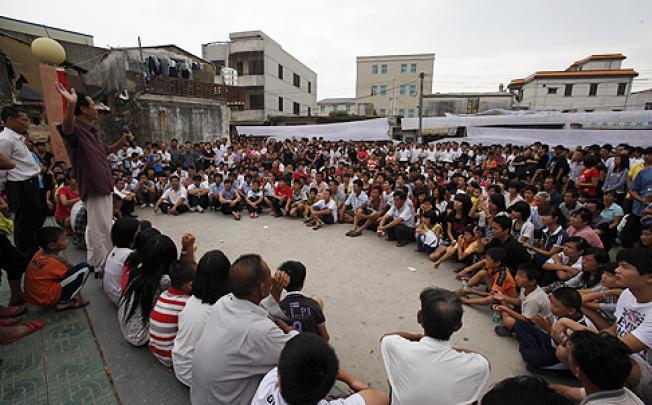Forced evictions in China have risen significantly in recent years as local officials sell off land to property developers, Amnesty International says.
Many cases involve violence and harassment, in what the group called “a gross violation of human rights”.
Pressure on local officials to meet economic goals and vested interests were behind the coercion, it said.
These evictions are a rumbling cause of social discontent and have led to protests across the country.
All land in China is effectively controlled by the state, and laws allow local governments to claim land for urban development projects.
Nicola Duckworth, Amnesty’s senior director of research in Hong Kong, said that seizing and selling off land was how local authorities were paying back funds borrowed to finance stimulus packages during the economic downturn.
“The Chinese Communist Party promotes officials who deliver growth seemingly at any cost, and land development for roads, factories, residential complexes and so on is seen as the most direct path to visible results,” she said.
Amnesty said the system was open to abuse and evictees often received little notice, no consultation and only a fraction of the value of their home in compensation.
Such cases have led to violent clashes between residents and police or private security guards on several occasions, the report said.
Amnesty interviewed lawyers, housing rights activists and academics, both in China and abroad, for its 85-page report entitled Standing Their Ground.
It looked at 40 cases of forced eviction from January 2009 to January 2012, nine of which it said culminated in deaths of people who opposed their evictions.
“The forced eviction of people from their homes and farmland without appropriate legal protection and safeguards has become a routine occurrence in China, and represents a gross violation of human rights obligations on an enormous scale,” Amnesty said.
Many cases are “sudden and violent, sometimes resulting in death”, harassment and in one instance, someone being buried alive.
Nicola Duckworth said self-immolations caused by evictions were also on the rise.
“We documented 41 reports of self-immolations from 2009 to the end of 2012,” she said.
Amnesty cited the example of Wukan village in Guangdong province in 2011, where residents demonstrated on the streets after a village negotiator protesting against local officials over a land grab died in police custody.
As a result of protests, two local officials were removed from their posts and others punished in 2012. The villagers also won the right to fresh local elections as part of the deal.
But “optimism might be premature” on the Wukan case, Amnesty said.
“To this day, there has been no independent investigation into [village negotiator] Xue Jinbo’s death. The villagers still have not got any of their land back. And there are now reports that authorities have been harassing and spying on activists in Wukan.”
The group called on China to put an immediate stop to all forced evictions and ensure safeguards were put in place in line with international law.
It also urged China to implement new regulations it adopted in 2011 providing for proper land compensation and outlawing the use of violence in these cases.
China does have laws in place to protect farmers and local residents, but these are often ignored at local level. Leaders in Beijing have acknowledged the problems and pledged to improve the situation.
Premier Wen Jiabao, in his report to the National People’s Congress in March, said that problems related to land expropriation and housing demolition “are still very serious and the people are still very concerned about them”.
[youtube xp3K6LeN-2Y]
